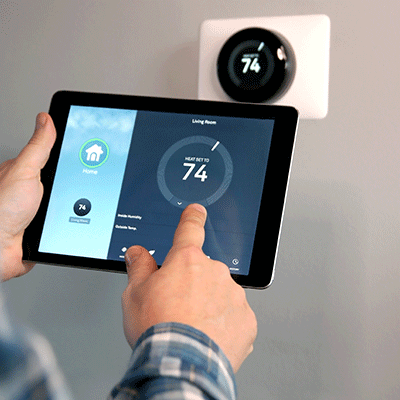
Ask a Heating and Air Conditioning Expert
You don’t need to be a heating and cooling expert to make smarter decisions—you just need to ask the right questions. Below, you’ll find basic information about residential heating and air conditioning. If you need more information, email reshvac@schebler.com and one of our staff members will get back to you.
Frequently Asked Question
Generally speaking, you can expect about 15 years of use from your furnace or air conditioner. That figure varies depending on operating conditions and equipment type. Meanwhile, equipment that isn’t properly cleaned and maintained can wear out much more quickly. If your furnace or air conditioner is older than 15 years but still running, it may still make financial sense to consider a replacement. HVAC equipment is significantly more energy-efficient than it used to be, and the difference in fuel consumption could pay for your investment in just a few years.
How do you know if your HVAC contractor is making the right decisions about your equipment? For one thing, your contractor should consider options other than replacement if your home isn’t as comfortable as it should be. Consider Home Performance Testing to identify less costly repairs you can make to your home’s ductwork or insulation to improve the performance of your furnace or air conditioner. If your equipment does need to be replaced, make sure your contractor performs a load calculation as part of the estimate. Even the most experienced contractor won’t be able to accurately determine the right size of equipment for your space without considering windows, doors, insulation and any other updates you may have done to your home. If a contractor simply wants to replace equipment with the same size units, get a second opinion. With recent advances in energy efficiency, you may be able to get the same level of comfort from a smaller furnace or air conditioner.
Many contractors recommend cleaning your ducts at every 3-5 years. In reality, if your ducts require regular cleaning, it’s an indication that your home isn’t filtering air the way it should or that your duct system is leaking. Consider Home Performance Testing to find where dirty air is getting into your system so you can address the problem at the source. Watch this video
Dirty filters make your system burn more fuel to maintain your desired comfort level. Changing them regularly is one of the easiest ways to improve the efficiency and performance of your furnace and air conditioning. Follow these guidelines: Disposable filter, 1-inch wide: Change monthly. Disposable filter, 4- to 6-inch wide: Change every six months. Permanent filter: Clean with soap and water every 45 days.
We believe it is important to check your air filters monthly. Depending on what type of air filter you have will greatly determine the health. If you have a disposable type filter and you start to notice it is dirty, we recommend you just throw it away and replace it with a new one. Non-reusable ones can last months, but it is still important to check them monthly to make sure they are up to code.
Cleaning your air filter every other month would help the air filters last longer. When you start to notice a lot of buildup, we recommend you take them off and clean them. Almost all air filters are directional, meaning the air flows through the filter in only one direction. Look for the arrow symbol indicating the direction of the air flow. You can use a hose and spray the filter clean. Once the filter dries off you can put it back.
Indoor air quality (IAQ) is the air quality within your home as it relates to you and your family’s health and comfort. Indoor pollution sources that release gases or particles into the air are the primary cause of IAQ problems in homes. Inadequate ventilation can increase indoor pollutant levels by not bringing in enough outdoor air to dilute emissions from indoor sources, and by not carrying indoor air pollutants out of the home. High temperature and humidity levels can also increase concentrations of some pollutants. Primary factors that affect IAQ are carbon monoxide, carbon dioxide, volatile organic compounds, particulates, temperature and humidity.
Americans spend 90% of their lives indoors, this statistic clearly stresses the importance of indoor air quality. Watch this video to learn how you can improve your indoor air quality when integrating into your heating and air conditioning system.
SEER stands for Seasonal Energy Efficiency Ratio. This number represents the total output of a cooling system divided by its electricity usage. The higher the SEER rating, the more efficient the air conditioning. Today, air conditioners have a minimum SEER requirement of 13. The most energy-efficient models can have a SEER rating as high as 21 or more.
AFUE stands for Annual Fuel Utilization Efficiency. This number shows what percentage of the oil or natural gas your furnace burns is actually heating your home or business. If your furnace has an AFUE rating of 90 percent, then you are losing about 10 percent of your energy through gaps in your system. Today, the Carrier Infinity Series offers furnaces with AFUE ratings as high as 98 percent.
Heating, ventilation, and air conditioning
Yes. An air conditioner and heater are a must when it comes to maintaining. Just like your car, you have to service and have regular upkeeps on the units to make sure the engine, mechanical devices, and electrical components are all working.
British Thermal Unit. BTU is a basic measure of energy.
The temperature settings of your thermostat depend mainly on the time of year and your personal preferences. If it is during the summer time, the average temperature setting is 75°-80°. During winter, we recommend that you keep it between 68°-72°.
A two-stage heating system means that a furnace has two levels of heat output. There are both; high for cold winter days and low for milder days. Having a two-stage means that the furnaces will start in the first stage, and will not reach full capacity all at once. Because of this, you will not see a sudden blast of air. When in the low setting, it will meet the household heating demands 80% of the time, allowing a two-stage unit to run for longer periods and provide more even distribution of heated air.
When you have too much humidity in your house, condensation will occur on windows and can be the main factor in breeding mold. When this happens it can lead to allergies and respiratory problems.
“A residential load calculation procedure, based on an accepted industry standard (approved by the American National Standards Institute) used for the proper sizing and selection of HVAC equipment in residential homes.” (AHRI)
Yes. Any noise coming from either your air conditioning or heater may pose a threat to your units. The best solution would be to call and schedule an appointment to have the noise looked at. Don’t wait! What could have been a simple fix may turn into a major problem.
Unit sizes vary completely by the size of your house, insulation, how many people live in the house, the number of windows, major heat producing equipment and personal preference.
This will change depending on the size of your unit and the square footage of your home. On average, a humidifier may use anywhere from 1.5 to 12 gallons per day when the furnace is running. While this does seem like a high number, it is just enough water to raise the humidity to the proper level, but not so much water that you will see a dramatic difference in your water bill.
No. Heat pumps and air conditioners run year-round and are made to withstand the outdoor environment.
A split unit uses both indoor and outdoor components. A package unit doesn’t require external heating units, coils, or air handlers.
A heat pump is an all-in-one cooling and heating system. A heat pump is different because it is all in one, unlike having two separate units (air conditioner & heating system).

